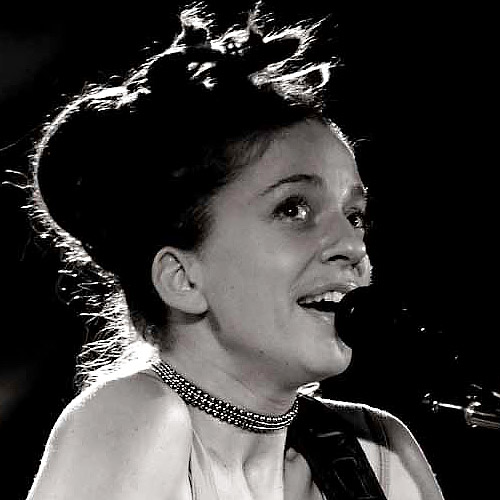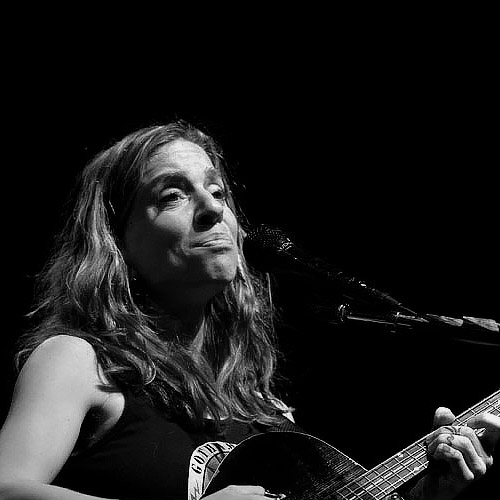Ani Di Franco In Conversation
With the recent release of her latest record I’m reprising an interview from a few years ago. Di Franco remains one of the greatest and most adventurous singer/songwriters anywhere, and her latest release UNPRECENTED SHIT proves that, like wine, Di Franco keeps getting better with age.
Do you feel uneasy about being labelled a poet? ‘Poet’ traditionally indicates a higher cultural status than ‘song writer’…
Though I’ve been writing longer without a guitar than with it, I hesitate to call myself a ‘poet’ for fear of sounding pompous. This is unfortunate because, with more humble connotations, ‘poet’ serves as a pretty accurate description of how I think and what I do. The line between songs and poems has always been blurry to me. If I had to describe a relationship between the two, I would say song writing is one poetic form or one genre in the vast endeavour of poetry. But really for me, it is more like they really one thing: a way of seeing. Involving endless meditations on the connections between things, a lot of squinting like a painter of the world’s basic structure in order to distil and convey its most resonant nature…and always, always a googly-eyed lecherous love of language. Always that.
Do you write lyrics because you feel words are a necessary companion to your music? Or do you do it out of a specific interest in the crafting of words, speech, verse? Would you still write poems if you could no longer play music alongside them?
Art has always been my ticket to joy. Growing up in a family whose mouths were closed against their own struggles (where hidden wounds festered and flared without light or air), left me with a burning desire to express myself. I learned that to give voice to a feeling is to set it free from your mind. I explored many art forms along the way, from dancing in ballet and modern dance troupes as a teenager, to attending art school and painting as a young adult. But I parked here at the intersection of music and poetry simply because it is the most precise and effective way I have found to communicate. So, I suppose, If I could not write or play guitar or sing or dance or paint, I would just find some other way to let the spirit out of its cage.
And assuming that Ani the singer turned into Ani the poet, would you be more interested in publishing books for people to read, or in ‘performing’ your poetry in front of a live audience?
I am a person who lives in the moment, so live performance has my heart, and I imagine it always will. The page is my workshop. There is a lot I write in my poems, rhythmically and melodically, that is meant to be performed, which I fear is rendered inert on paper. I don’t know. Maybe these are poems in my Self Evident book, or maybe they are merely transcripts of a show that is happening elsewhere.
You were eighteen when you released your first album. Do you think your song writing has changed much since then? Do you find writing easier or more difficult? Are you interested in some particular themes? Do you feel that the girl who wrote ‘The Slant’ is the same woman who has just written ‘Serpentine‘?
The eighteen-year-old who wrote The Slant is long gone, but that poem has aged on my tongue like wine, becoming deeper and more complex. It is strange to say, but I think even more than my work has grown, I have grown within it, so that now when I perform an old poem like ‘The Slant’, I can say more with it than I could when I first wrote it.
Both your music and poetry are introspective and intimate; about love, relationships etc; others are political, and very explicitly so. Do you perceive this difference as a deep and significant one, and do you deliberately choose one subject over the other each time? Or do you feel that writing about love or about politics are basically just two ways of talking about yourself and the stuff you’re passionate about?
I write about that which captivates my heart and my imagination. My focus has always been partly on my female identity and the struggle to survive love and everyday gender dynamics, and partly on the big ‘P’ politics of the society at large. In one sense I am a woman trying to hammer out a space in the world to exist in, and in another sense I am a citizen, assimilated into a society that, because of my citizenship, is my responsibility. My ongoing narrative about my relationships with other people (my ‘personal’ songs), is part of the femininity of my work. Like many women, my attention is often focused on the emotional landscape of the people around me, and our interactions. These ‘personal’ songs are also ‘political’, however, as simply speaking from one’s experience as a woman in a man’s world is a political act. For a woman to speak up about even the most simple and intimate circumstances of her life is in some way an act of inclusion in a culture which does not often affirm or respect the sensibilities of women.
Page: 1 2
|
|

|
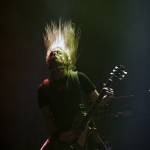
Black Stone Cherry |
LATEST GALLERY IMAGES
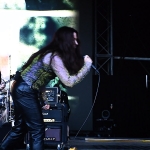
Alanis Morissette 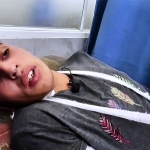
Where Israel Goes, Misery Follows |
|
|




